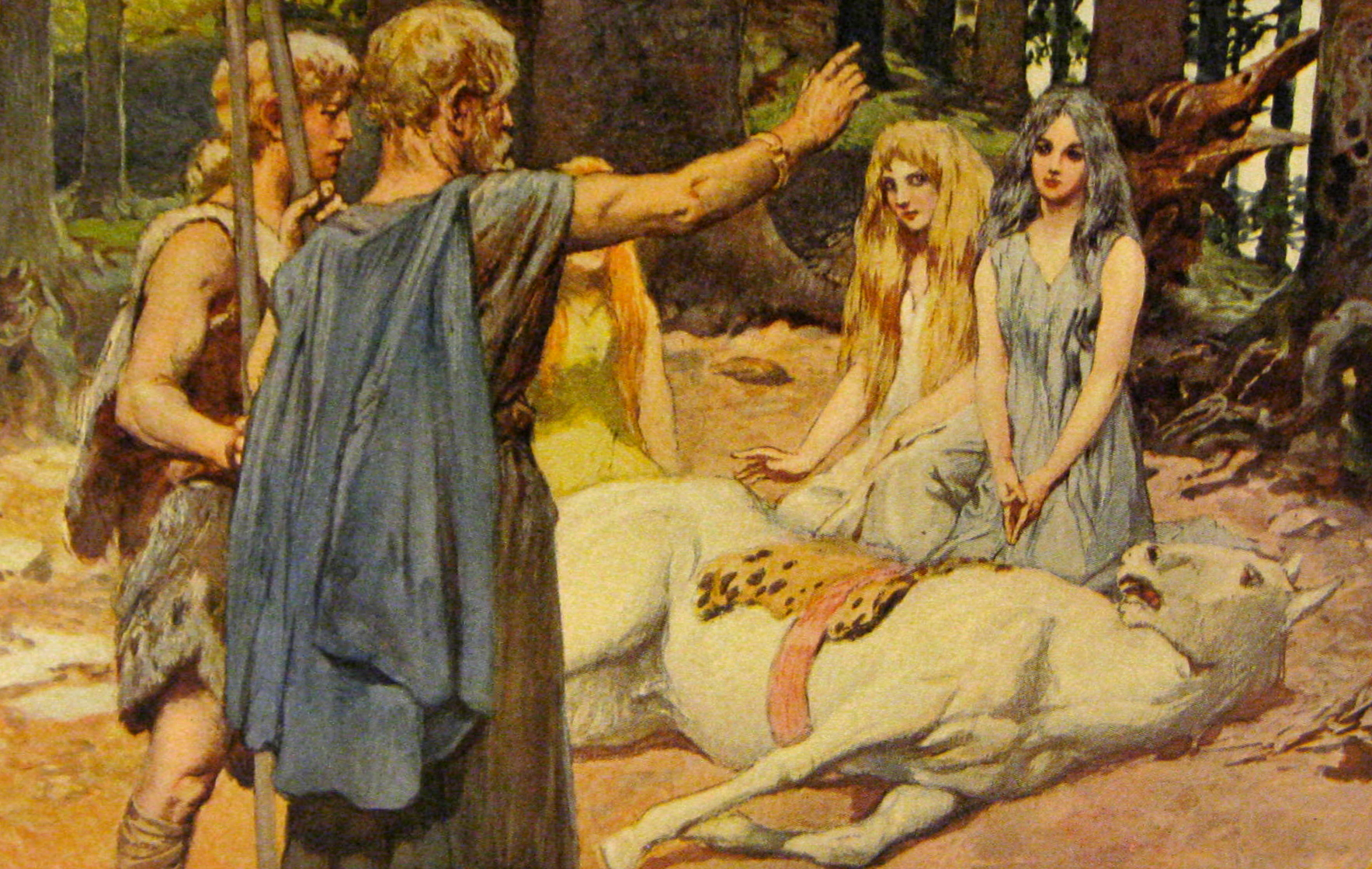|
List Of Germanic Deities
In Germanic paganism, the indigenous religion of the ancient Germanic peoples who inhabited Germanic Europe, there were a number of different gods and goddesses. Germanic deities are attested from numerous sources, including works of literature, various chronicles, runic inscriptions, personal names, place names, and other sources. This article contains a comprehensive list of Germanic deities outside the numerous Germanic Matres and Matronae inscriptions from the 1st to 5th century CE. Gods Goddesses Pseudo-deities and purported deities * Astrild, a synonym for the Roman deity Amor or Cupid invented and used by Nordic Baroque and Rococo authors * Frau Berchta, a purported deity and female equivalent of Berchtold proposed by Jacob Grimm * , a purported deity potentially stemming from a folk etymologyMeyers Großes Konversations-Lexikon, Band 2. Leipzig 1905, S. 832. * Holda, a purported deity proposed by Jacob Grimm * Jecha, a purported deity potentially stemming from a fo ... [...More Info...] [...Related Items...] OR: [Wikipedia] [Google] [Baidu] |
Wodan Heilt Balders Pferd By Emil Doepler
Odin (; from non, Óðinn, ) is a widely revered god in Germanic paganism. Norse mythology, the source of most surviving information about him, associates him with wisdom, healing, death, royalty, the gallows, knowledge, war, battle, victory, sorcery, poetry, frenzy, and the runic alphabet, and depicts him as the husband of the goddess Frigg. In wider Germanic mythology and paganism, the god was also known in Old English as ', in Old Saxon as , in Old Dutch as ''Wuodan'', in Old Frisian as ''Wêda'', and in Old High German as , all ultimately stemming from the Proto-Germanic theonym *''Wōðanaz'', meaning 'lord of frenzy', or 'leader of the possessed'. Odin appears as a prominent god throughout the recorded history of Northern Europe, from the Roman occupation of regions of Germania (from BCE) through movement of peoples during the Migration Period (4th to 6th centuries CE) and the Viking Age (8th to 11th centuries CE). In the modern period, the rural folklore of Germanic Eu ... [...More Info...] [...Related Items...] OR: [Wikipedia] [Google] [Baidu] |
Bragi
Bragi (; Old Norse: ) is the skaldic god of poetry in Norse mythology. Etymology The theonym Bragi probably stems from the masculine noun ''bragr'', which can be translated in Old Norse as 'poetry' (cf. Icelandic ''bragur'' 'poem, melody, wise') or as 'the first, noblest' (cf. poetic Old Norse ''bragnar'' 'chiefs, men', ''bragningr'' 'king'). It is unclear whether the theonym semantically derives from the first meaning or the second. A connection has been also suggested with the Old Norse ''bragarfull'', the cup drunk in solemn occasions with the taking of vows. The word is usually taken to semantically derive from the second meaning of ''bragr'' ('first one, noblest'). A relation with the Old English term ''brego'' ('lord, prince') remains uncertain. ''Bragi'' regularly appears as a personal name in Old Norse and Old Swedish sources, which according to linguist Jan de Vries might indicate the secondary character of the god's name. Attestations Snorri Sturluson writes i ... [...More Info...] [...Related Items...] OR: [Wikipedia] [Google] [Baidu] |
Sceaf
Sceafa ( ang, Scēafa , also ''Scēaf'', ''Scēf'') was an ancient Lombardic king in English legend. According to his story, Sceafa appeared mysteriously as a child, coming out of the sea in an empty skiff. The name also appears in the corrupt forms ''Seskef'', ''Stefius'', ''Strephius'', and ''Stresaeus''. Though the name has historically been modernized Shava (and Latinized Scefius), J.R.R. Tolkien used the correctly constructed modern English spelling ''Sheave''. ''Widsith'' The Old English poem ''Widsith'', line 32, in a listing of famous kings and their countries, has ''Sceafa Longbeardum'', so naming Sceafa as ruler of the Lombards. In ''Origo Gentis Langobardorum'' the Lombards' origins are traced to an "island" in the north named Scadan or Scandan ("Scandinavia"). But neither this account or any other mentions Sceafa among their later kings or gives the names of any kings that ruled them in the land of their origin where they were said to have been known as the Winnili. ... [...More Info...] [...Related Items...] OR: [Wikipedia] [Google] [Baidu] |
Hermóðr
Hermóðr (Old Norse: , "war-spirit";Orchard (1997:83). anglicized as Hermod) is a figure in Norse mythology, a son of the god Odin and brother of Baldr. He is often considered the messenger of the gods. Attestations ''Prose Edda'' Hermóðr appears distinctly in section 49 of the ''Prose Edda'' book ''Gylfaginning''. There, it is described that the gods were speechless and devastated at the death of Baldr, unable to react due to their grief. After the gods gathered their wits from the immense shock and grief of Baldr's death, Frigg asked the Æsir who amongst them wished "to gain all of her love and favor"Byock (2005:66). by riding the road to Hel. Whoever agreed was to offer Hel a ransom in exchange for Baldr's return to Asgard. Hermóðr agreed to this and set off with Sleipnir to Hel. Hermóðr rode Odin's horse Sleipnir for nine nights through deep and dark valleys to the Gjöll bridge covered with shining gold, the bridge being guarded by the maiden Móðguðr 'Battle-fr ... [...More Info...] [...Related Items...] OR: [Wikipedia] [Google] [Baidu] |

